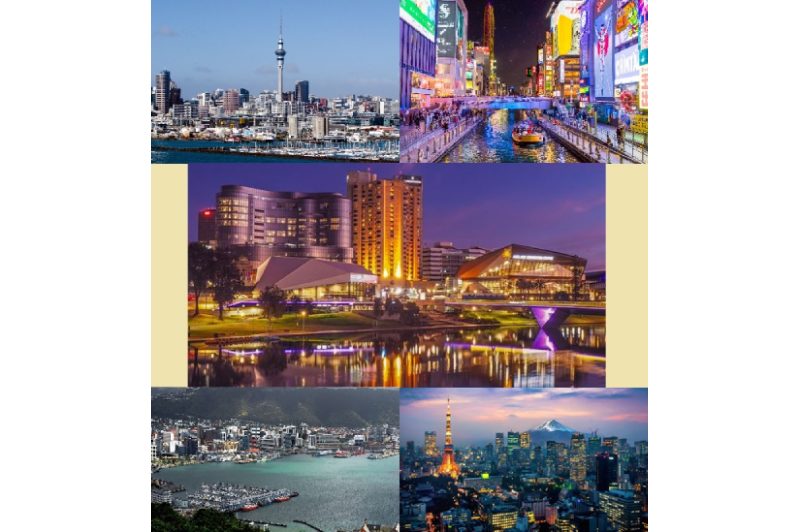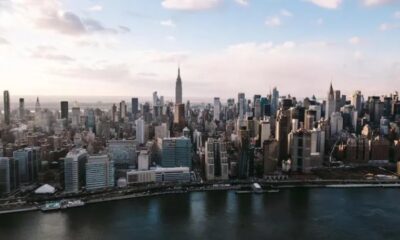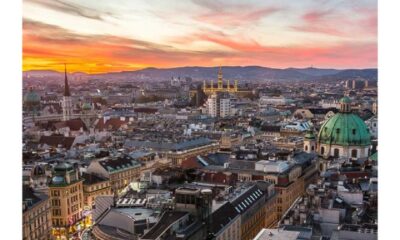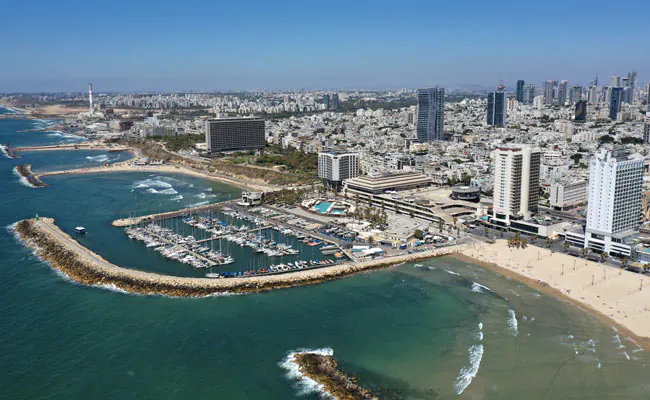World
Top 10 Liveable Cities in the world, as per Global Liveability Index Report 2021

The Economist Intelligence Unit releases its Global Liveability Index Report for 2021. The Economist Intelligence Unit’s Global Liveability Index for 2021 ranks 140 cities across the world dependent on the five categories of stability, healthcare, education, culture and environment, and infrastructure. It was New Zealand’s Auckland, however, that took out the top position, followed by Japan’s Osaka in second place.
The Economist Intelligence Unit’s latest Global Liveability Index — which considered factors including healthcare, education, and infrastructure across 140 cities throughout the world — listed Adelaide simply behind Auckland and Osaka, and only in front of Wellington, in terms of the local lifestyle.
Evaluated by key features like Stability (25%), Healthcare (20%), Culture and Environment (25%), Education (10%), and Infrastructure (20%), this year, Auckland has secured the seat with a great total score of 96.0 – leading its nearest competition, Osaka in Japan, by 1.8 points.
“Auckland, in New Zealand, is at the top of The Economist Intelligence Unit’s Liveability rankings, owing to the city’s ability to contain the coronavirus (Covid-19) pandemic faster and thus lift restrictions earlier, unlike others around the world,” reads the Global Liveability Index 2021 report.
“Six of the top ten cities in the March 2021 survey are in New Zealand or Australia, where tight border controls have allowed residents to live relatively normal lives.”
“Owing to border closures and consequently low COVID-19 case count, New Zealand has been able to keep its theatres, restaurants, and other cultural attractions open,” reads the rationale.
“Students have been able to continue going to school, giving Auckland a 100% score for education. This has allowed the city to move up from 6th place in our Autumn 2020 survey to the first position in our March 2021 rankings.”
Six of the current year’s top ten are from Australia and New Zealand, with Auckland taking the title of the world’s most liveable city in front of Japan’s Osaka and afterward Adelaide.
It is the South Australian capital’s highest ranking on the index since 2015 when it placed fifth, and represents a seven-spot increment from its 10th-placed finish in 2019.
The index gave Adelaide an ideal score for the categories of healthcare and education, as well as a 96.4 for infrastructure, a 95 for stability, and an 83.8 for culture and environment.
The report’s creators ascribed Adelaide’s high rating to its closed international borders and noticed the pandemic had caused “high volatility” in the current year’s index.
Wellington and Tokyo rounded out the top five, while Perth (6), Melbourne (8), and Brisbane (10) were the other Australian cities to make the top 10.
Sydney – who was ranked third in the 2019 index – smashed out of the top ten to complete 11th, while Melbourne – who was rated the world’s most liveable city from 2011 to 2017 – was consigned to joint-eighth in the wake of completing second in 2019.
Deloitte Access Economics partner Aaron Hill said Adelaide has “always done well” in the EIU’s investigation, however, it was especially satisfying to see this proceed in the wake of the pandemic.
Somewhere else, COVID lockdowns across Europe saw the region record a tremendous liveability droop, with just the Swiss cities of Zurich (7) and Geneva (8) completing in the top 10.
Austria’s capital Vienna – positioned world number one from 2018 to 2020 – dropped to the 12th spot, while the German cities of Hamburg, Frankfurt, and Dusseldorf lost 34, 29, and 28 places respectively.
The Canadian cities of Calgary, Vancouver, and Toronto likewise exited the top ten.
NZ’s capital Wellington has additionally appreciated some upward versatility on the leader board, moving from an already-respectable 15th place to joint fourth with Tokyo in Japan.
Regardless of our most heavily populated state capitals – Sydney and Melbourne – experiencing a decrease in the continuous rankings (the previous out of the Top 10 completely), Australia actually had a strong appearance this time around. The highest result ended up going to Adelaide in the third spot with 94.0, followed by Perth in sixth with 93.3, Melbourne in ninth with 92.5, rounded out by Brisbane in tenth with 92.4. Sydney right now finds itself on the outside at 11th place.
Despite getting a charge out of probably the most relaxed limitations the country over, Sydney dropped from third to eleventh in a comparative jump to Melbourne.
The report additionally noticed that the average score for culture and environment across the world fell by 14 points compared to pre-pandemic levels, fundamentally because of curbs on public gatherings.
In any case, the authors express that cities in Australia and New Zealand have to a great extent had the option to lift these social and cultural limitations and reverse negative trends in the culture and environment category.
Outgoing Committee for Adelaide CEO Jodie van Deventer featured Adelaide’s “vibrant arts culture” and embracement of the “jobs and industries of the future” as key purposes behind the city’s high placing.
The global survey was delayed in 2020 as implemented lockdowns made it hard for contributors and master experts to gather information for many cities.
The Austrian capital Vienna topped the 2019 list however dropped out of the top 10 to 12th after managing its own second wave of COVID.
The German cities of Frankfurt, Hamburg, and Dusseldorf experienced the biggest falls of the 140 reviewed, while Montreal, Vancouver, Calgary, and Toronto in Canada additionally dropped.
“The downward movement in rankings for the European and Canadian cities can be attributed to the heightened stress on healthcare resources during the second wave of the pandemic,” the index said.
At the opposite end of the rankings, war-torn Syrian capital Damascus was named the world’s least liveable city, while Lagos, Nigeria, and Port Moresby, Papua New Guinea were positioned second and third-worst.
Rome dropped 21 positions to 57; Hamberg, in Germany, lost 34 spots to come in at 47; and Dublin was positioned at 51, down 22 spots.
The Economist says the other end of the rankings scale – the worst places to live – remained genuinely unchanged. The Syrian capital, Damascus, is as yet the least liveable city in the world. Caracas, in Venezuela, was ranked 131, Lagos, in Nigeria 139, and PNG’s Port Moresby was ranked 138.
Look at the world’s most liveable cities for 2021 as indicated by the Economist Intelligence Unit below.
The 10 Most Liveable Cities (Global)
- Auckland, New Zealand (96.0)
- Osaka, Japan (94.2)
- Adelaide, Australia (94.0)
- Wellington, New Zealand (93.7)
- Tokyo, Japan (93.7)
- Perth, Australia (93.3)
- Zurich, Switzerland (92.8)
- Geneva, Switzerland (92.5)
- Melbourne, Australia (92.5)
- Brisbane, Australia (92.4)
The 10 Least Liveable Cities (Global)
- Damascus, Syria (26.5)
- Lagos, Nigeria (31.2)
- Port Moresby, PNG (32.5)
- Dhaka, Bangladesh (33.5)
- Algiers, Algeria (34.1)
- Tripoli, Libya (34.2)
- Karachi, Pakistan (36.2)
- Harare, Zimbabwe (38.6)
- Douala, Cameroon (38.6)
- Caracas, Venezuela (41.7)
-
Health3 weeks ago
Back to Roots: Ayurveda Offers Natural Cure for Common Hair Woes
-

 Tech3 weeks ago
Tech3 weeks agoFrom Soil to Silicon: The Rise of Agriculture AI and Drone Innovations in 2025
-

 Science1 week ago
Science1 week agoJuly Full Moon 2025: Everything You Should Need to Know, When and Where to See Buck Moon
-

 Sports3 weeks ago
Sports3 weeks agoFIBA 3×3 World Cup 2025: Full Schedule, Preview, and How to Watch
-

 Gadget4 weeks ago
Gadget4 weeks agoThings to Know about Samsung Galaxy S26: What’s New and What’s Next
-

 Tech4 weeks ago
Tech4 weeks agoAdobe Firefly App Now Available on iOS and Android Phones to Create AI Images and Videos Anywhere
-

 Sports2 weeks ago
Sports2 weeks agoPrefontaine Classic 2025: Full Schedule, Preview, Field, Events and How to Watch Diamond League Eugene Live
-

 Festivals & Events4 weeks ago
Festivals & Events4 weeks agoEverything You Should Need to Know about Summer Solstice 2025


















